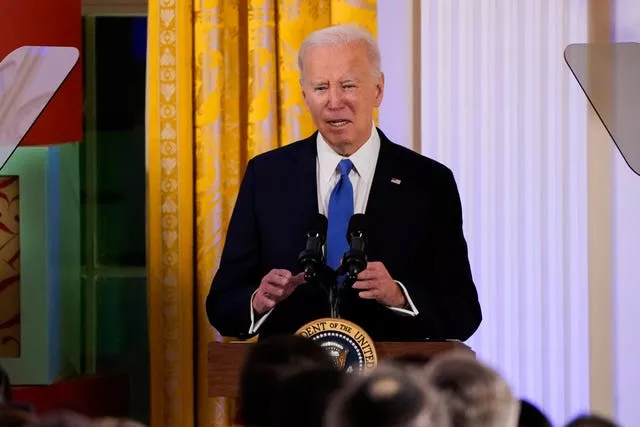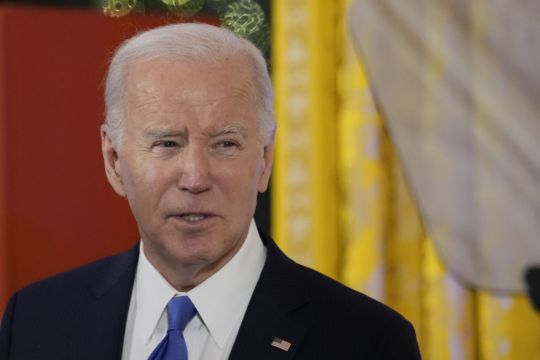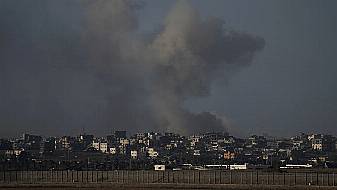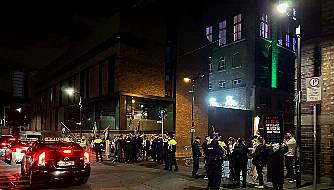US president Joe Biden warned that Israel was losing international support because of its “indiscriminate bombing” of Gaza.
The president spoke out with unusually strong language speaking out in unusually strong language just hours before the United Nations demanded a humanitarian ceasefire in the Israel-Hamas war.
Mr Biden said to donors during a fundraiser on Tuesday: “Israel’s security can rest on the United States, but right now it has more than the United States.

“It has the European Union, it has Europe, it has most of the world supporting them.
“They’re starting to lose that support by indiscriminate bombing that takes place.”
The president said he thought prime minister Benjamin Netanyahu understood, but he was not so sure about the Israeli war cabinet.
Israeli forces were carrying out punishing strikes across Gaza, crushing Palestinians in their homes as the military presses ahead with an offensive that officials say could go on for weeks or months.
The president offered a harder-than-usual assessment of Israel’s decisions since the October 7th attack by Hamas and the moves by his conservative government.
Mr Biden’s top national security adviser, Jake Sullivan, will head to Israel this week to consult directly.
Mr Biden also renewed his warnings that Israel should not make the same mistakes of overreaction that the US did following the September 11th, 2001 terrorist attacks.
Mr Biden recounted a well-worn story about him inscribing on a photo with Mr Netanyahu decades ago, “Bibi, I don’t agree with a damn thing you have to say”.
This time, the president added to his retelling of the story: “That remains to be the case.”
The fundraiser was part of a gathering of Jewish donors, many of whom attended a White House Hanukkah reception on Monday evening.
Mr Biden said that when he warned Mr Netanyahu of a loss of international support over the bombing, the Israeli leader mentioned that the US had “carpet-bombed Germany” in World War II and dropped the atomic bomb on Japan.
“That’s why all these institutions were set up after World War II, to see that it didn’t happen again,” he said.
“Don’t make the same mistakes we made in 9/11. There’s no reason we had to be in a war in Afghanistan. There’s no reason we had to do so many things that we did.”

The UN General Assembly voted on Tuesday overwhelmingly in favour of a non-binding resolution demanding an immediate humanitarian ceasefire.
The vote comes days after the US vetoed a similar measure at the UN Security Council.
The UK abstained from the 13-1 vote but France and Japan were among those supporting the call for a ceasefire.
Only Security Council resolutions are legally binding under the terms of the international body’s charter.
Before Mr Biden’s comments at the fundraiser, Mr Netanyahu said in a statement that he appreciated American support and that he had received “full backing for the ground incursion and blocking the international pressure to stop the war”.
“Yes, there is disagreement about ‘the day after Hamas’ and I hope that we will reach an agreement here as well.
“I would like to clarify my position: I will not allow Israel to repeat the mistake of Oslo. Gaza will be neither Hamastan nor Fatahstan.”

Mr Biden specifically called out Itamar Ben-Gvir, the leader of a far-right Israeli party and the minister of national security in Mr Netanyahu’s governing coalition, who opposes a two-state solution and has called for Israel to reassert control over all of the West Bank and Gaza.
Mr Ben-Gvir sits on Israel’s security cabinet but is not a member of the country’s three-person war cabinet.
Earlier on Tuesday, Mr Sullivan said he would speak with Mr Netanyahu about timetables for ending major combat in Gaza, and that he would be carrying Mr Biden’s thoughts on the matter.
He said he would also be looking to hear from Mr Netanyahu and Israeli officials on the issue.
“The subject of how they are seeing the timetable of this war will certainly be on the agenda for my meetings,” Mr Sullivan said during an appearance at a forum hosted by the Wall Street Journal.
The national security adviser suggested that at some point there would be a shift from the high-intensity Israeli operations seen over the last several weeks to more focused operations to achieve Israeli objectives.
He also said he would also speak to Mr Netanyahu about his recent comments that Israel Defence Forces would maintain open-ended security control of Gaza after the war ends.
Mr Sullivan reiterated the Biden administration’s position that it does not want to see Israel reoccupy Gaza or further shrink its already small territory.
The US has repeatedly called for a return of the internationally recognised Palestinian Authority and the resumption of peace talks aimed at establishing a Palestinian state alongside Israel.
“I will have the opportunity to talk to Prime Minister Netanyahu about what exactly he has in mind with that comment because that can be interpreted in a number of different ways,” Mr Sullivan said. “But the US position on this is clear.”







